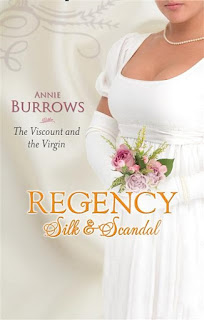"How do you plan your books? A kiss at 25%, sex at 50%, an argument at 75%? Or do your books grow organically?"
Organically, definitely. From somewhere out of the depths of my imagination will come a scene, or an incident… (eg, a girl waking up in bed, naked, with a stranger and no memory of how she got there, or hiding from an embarrassing moment in a ballroom only to witness a scheming woman trying to entrap a man, and facing the moral dilemma of whether to risk more embarrassment by coming out of hiding and saving the hapless man, or staying hidden and feeling guilty for leaving him to his fate.)
From then, I imagine what led up to that moment. And how the participants in it will deal with it going forward. And, yes, since I write for Harlequin Mills & Boon, how I can resolve all their problems and give them a happy ending.
The scenarios that will lead to a happy ending may get worked into a synopsis, or brief outline, and filed away in one of my many notebooks. So that if ever I run out of stories I’m burning to write, I can consult them for inspiration.
Sometimes the story flitting round in my head is so consuming I HAVE to write it down, and really come up with ways by which the poor unfortunate creature I have imagined in her pickle, can find a way to achieve a happy ever after.
The actual amount of kissing, or sexual intimacy which I write can vary immensely, since it stems very much from the characters personalities and the situations into which I have flung them. In some stories, for example where the couple have to marry for some reason at the start, they may work through their issues with arguments alternating with make-up sex (I think of these as honeymoon books)
In others, if my heroine is a complete innocent, and the hero is trying to win her, or rescue her, then they might not even kiss with any passion until pretty near the end. (my courtship books) It really does depend on the characters.
So my books are a bit like Forrest Gump’s box of chocolates. You never know what you’re going to get. (And please, no quips about preferring hard or soft centres!)
The one thing I do need to factor in, at a certain point of the drama, is the “dark moment”. Just as the characters seem to be finding their way to each other, there has to be an incident which will almost tear them apart, which will test the strength of their love, so that when they come through it, the happy ending feels much more emotionally satisfying than if they hadn’t had to face it.
But of course, being a romance, they will come through, in one way or another, whether it means the hero climbing in through a bedroom window with a rose tucked into his crossbelt (An Escapade and an Engagement) or simply writing the heroine a revised list (Lord Havelock's List) (Though it’s funny how it nearly always seems to be the hero who has to do the grovelling!)
To be honest, I think that planning out my books to the extent you mentioned would feel a bit like painting by numbers. Maybe it would be a bit easier if I could produce stories in this way, but I wouldn’t feel as if I was being so creative. Nor would I get that sense of getting to know my characters as I write about them. They wouldn’t become such real people to me, or, I suspect, to the reader.
Annie's next book is "The Major Meets his Match," the first of a mini-series with three heroes attempting to solve a crime.
Annie considers it one of her "courtship" books.
It is available for pre-order from Amazon.
You can read the opening on Overdrive








































